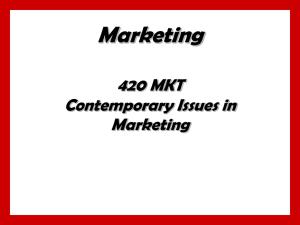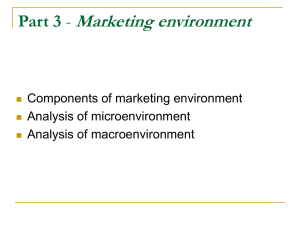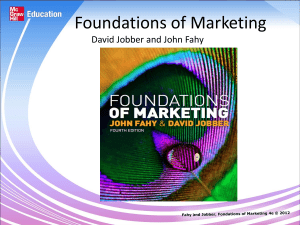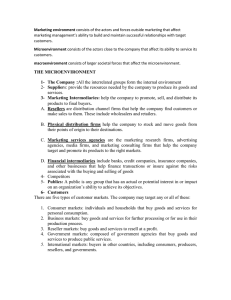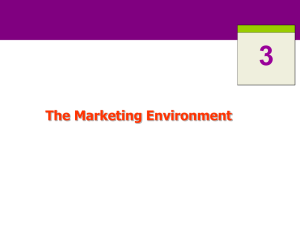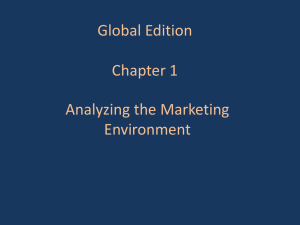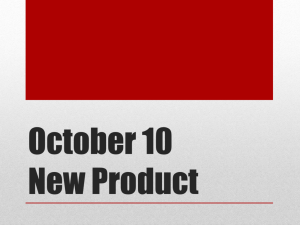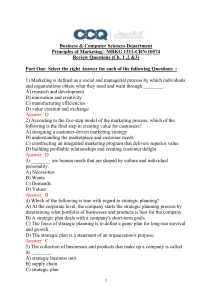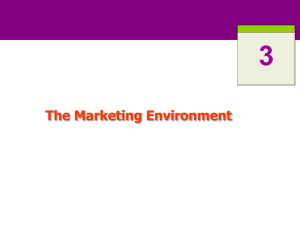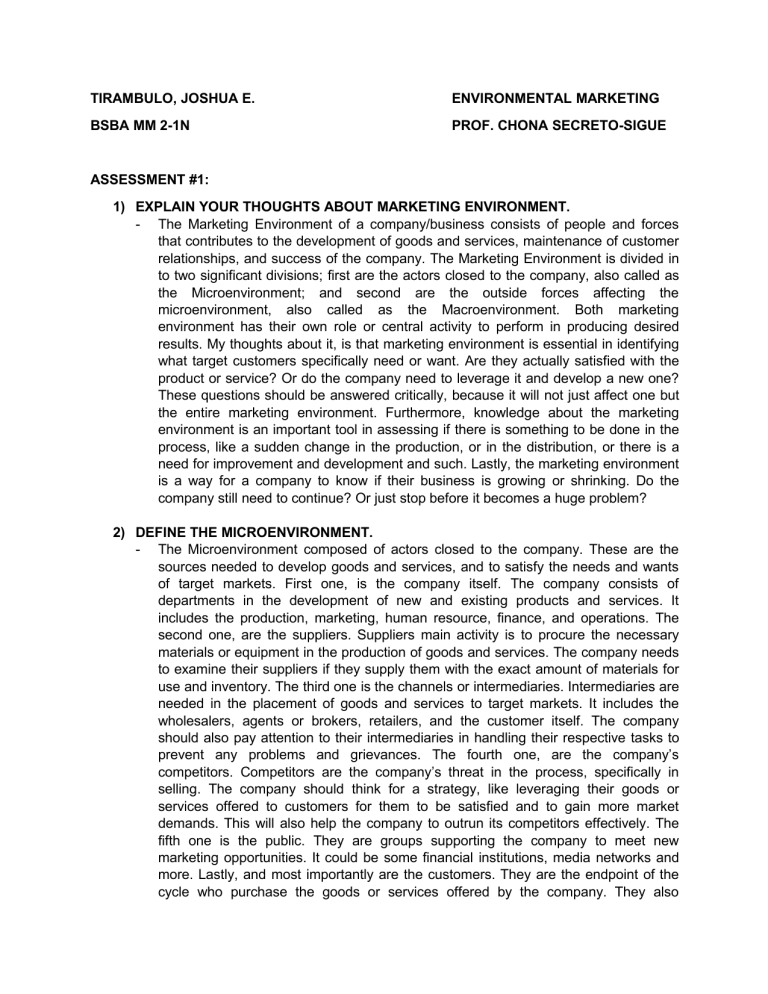
TIRAMBULO, JOSHUA E. ENVIRONMENTAL MARKETING BSBA MM 2-1N PROF. CHONA SECRETO-SIGUE ASSESSMENT #1: 1) EXPLAIN YOUR THOUGHTS ABOUT MARKETING ENVIRONMENT. - The Marketing Environment of a company/business consists of people and forces that contributes to the development of goods and services, maintenance of customer relationships, and success of the company. The Marketing Environment is divided in to two significant divisions; first are the actors closed to the company, also called as the Microenvironment; and second are the outside forces affecting the microenvironment, also called as the Macroenvironment. Both marketing environment has their own role or central activity to perform in producing desired results. My thoughts about it, is that marketing environment is essential in identifying what target customers specifically need or want. Are they actually satisfied with the product or service? Or do the company need to leverage it and develop a new one? These questions should be answered critically, because it will not just affect one but the entire marketing environment. Furthermore, knowledge about the marketing environment is an important tool in assessing if there is something to be done in the process, like a sudden change in the production, or in the distribution, or there is a need for improvement and development and such. Lastly, the marketing environment is a way for a company to know if their business is growing or shrinking. Do the company still need to continue? Or just stop before it becomes a huge problem? 2) DEFINE THE MICROENVIRONMENT. - The Microenvironment composed of actors closed to the company. These are the sources needed to develop goods and services, and to satisfy the needs and wants of target markets. First one, is the company itself. The company consists of departments in the development of new and existing products and services. It includes the production, marketing, human resource, finance, and operations. The second one, are the suppliers. Suppliers main activity is to procure the necessary materials or equipment in the production of goods and services. The company needs to examine their suppliers if they supply them with the exact amount of materials for use and inventory. The third one is the channels or intermediaries. Intermediaries are needed in the placement of goods and services to target markets. It includes the wholesalers, agents or brokers, retailers, and the customer itself. The company should also pay attention to their intermediaries in handling their respective tasks to prevent any problems and grievances. The fourth one, are the company’s competitors. Competitors are the company’s threat in the process, specifically in selling. The company should think for a strategy, like leveraging their goods or services offered to customers for them to be satisfied and to gain more market demands. This will also help the company to outrun its competitors effectively. The fifth one is the public. They are groups supporting the company to meet new marketing opportunities. It could be some financial institutions, media networks and more. Lastly, and most importantly are the customers. They are the endpoint of the cycle who purchase the goods or services offered by the company. They also evaluate if the product or service offered to them satisfies their needs or wants. If satisfied, there will be more demand and production. It also creates customer relationship. And if not, the company should put it into consideration and try a new one. 3) DEFINE THE MACROENVIRONMENT. - The Macroenvironment on the other hand, are factors affecting the Microenvironment. The first one is the Economic Environment. It has to do with customers’ purchasing power and spending activities. These purchases could be influenced by a person’s occupation or profession, or more likely by a person’s economic circumstances. The second one is the Technological Environment. It has to do with innovations, research and development of a company to improve its product and services. The third one is the Demographic Environment. It has to do with a person’s demography needed for market segmentation. It could be age of a person, gender, civil status, income, and more. For example, are breastmilk substitutes for infants, ages 1-3. The fourth one is Natural Environment. It has to do with natural disasters, or phenomenon affecting the Microenvironment. The company itself needed to sort things out, and adapt to the changes in the environment. The fifth one is the Political-Legal Environment. It has to do with laws and contractual agreements between government and company business to ensure that businesses regulate their activities and duties. Lastly, is the Socio-Cultural Environment. It is made up of values and lifestyle, culture and beliefs that every individual has possesses. It influences the buying and purchasing behavior of customers.
